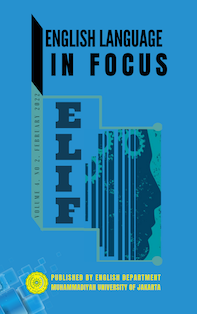Implementing Task-Based Language Teaching (TBLT) Instruction for Non-English Students
DOI:
https://doi.org/10.24853/elif.4.2.179-186Keywords:
TBLT, English Teaching, Speaking SkillAbstract
Most of STMIK Yadika Bangil students are workers in some institution and foreign companies in Pasuruan District. The students are aware how important speaking skill either in study or in work life. However, previous background and students focus is not in studying English. Thus, it causes they seem to be shy exploring their idea, less-confident and be passive in speaking because they recognize that is difficult skill. This research is Class Action Research (CAR). The researcher concerns on their speaking participation rather than other skills because speaking is productive skill which can be directly and empirically observed. This research use TBLT (Task-Based Language Teaching) method to solve Informatics students in English class. This method is valued as effective and interactive way to create class to be more interactive each other. As one of the aim of TBLT method is to motivate students to be more active in speaking without burdening with structure or grammatical matter. The research methods used are literary study, observation and problem identification, method design and material preparation, implementation, analysis, discussing and conclusion. The results show that most students are more enthusiastic and more participative in speaking English and able to express ideas without having to be burdened with English grammatical or structure.References
Brown, H. Douglas. 2007. Teaching by Principles, An Interactive Approach to Language Pedagogy. USA : Pearson Education, Inc.
Dailey, Aja. 2009. Implementing Task-Based Language Teaching in Korean Classrooms. University of Birmingham
Ducker, Nathan. 2012. Enriching the Curriculum with Task-Based Instruction.
Ellis, R. (2003). Task-based Language Learning and Teaching. Oxford: Oxford University Press.
Ellis, R. (2009). Task-based language teaching: sorting out the misunderstandings, International Journal of Applied Linguistics, 19(3), 221 - 246.
Gillis, Jeff. (2020). Top 10 Interview Questions for 2020. Retrieved January 5, 2020, from https://theinterviewguys.com/top-10-job-interview-questions/
Hosseini, Hossein Shams & Rahbar, Mohhammad. 2012. A New Trend in Education: Task-Based Methodology for Teacher/ Learners. Singapore: IACSIT Press- International Conference on Management and Education Innovation IPEDR vol.37
Hadley, G. (2000). A Task-Based Approach to Teaching English for Science and Technology. Retrieved December 7, 2019, from http://www.nuis.ac.jp/~hadley/publication/kosentbl/taskbased.htm
Hyde, Colleen. 2013. Task-Based Language Teaching in the Business English Classroom. University of Wisconsin-River Falls
Khotimah. Khusnul. 2015. Implementing Task-Based Language Teaching Instruction to Improve Students’ Speakiang Participation in Islamic Boarding School, State Islamic University of Malang. Malang: Thesis of UNISMA
Kumaravadivelu, B. (2003). Beyond Methods: Macro strategies for Language Teaching. New Haven: Yale University Press.
Latief, M. A. 2009. Classroom Action Research in Language. State University of Malang: Malang
Nunan, D. (2004). Task-Based Language Teaching (1st ed.). New York: Cambridge University Press
William, M. and R.L. Burden. (1997). Psychology for Language Teachers: A Social Constructivist Approach. Cambridge: Cambridge University Press
Willis, J. 1996. A Frame for Task-Based Learning. London: Longman.
Downloads
Published
Issue
Section
License
Authors who publish with this journal agree to the following terms:
- Authors retain copyright and grant the journal right of first publication with the work simultaneously licensed under a Creative Commons Attribution License that allows others to share the work with an acknowledgment of the work's authorship and initial publication in this journal.
- Authors can enter into separate, additional contractual arrangements for the non-exclusive distribution of the journal's published version of the work (e.g., post it to an institutional repository or publish it in a book), with an acknowledgment of its initial publication in this journal.
- Authors are permitted and encouraged to post their work online (e.g., in institutional repositories or on their website) before and during the submission process, as it can lead to productive exchanges, as well as earlier and greater citation of published work (See The Effect of Open Access).


